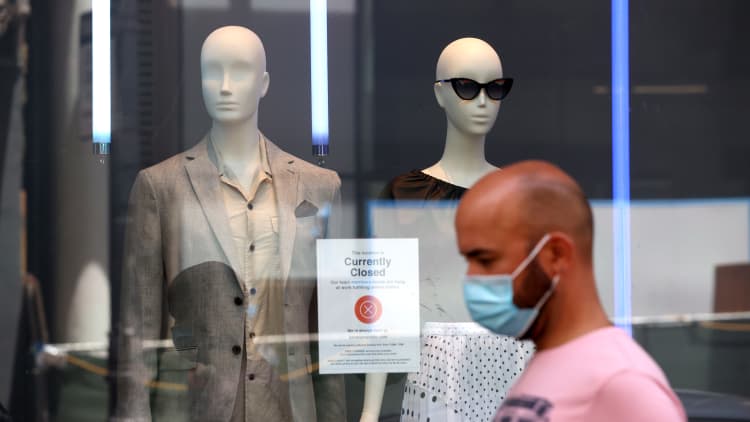
As retail sales pick up again, National Retail Federation CEO Matthew Shay said he wants to make sure small and midsized stores and restaurants can make a comeback, too.
"They get hit harder and they get hit first and so we need to bring them back quickly," he said Tuesday on CNBC's "Squawk Box."
Retail sales jumped by 17.7% in May, according to a government report released Tuesday morning. That includes customers' online purchases, as well as those at brick-and-mortar restaurants, bars and stores. It's the sharpest one-month jump on record.
Excluding food services, May retail sales were only down by 1.4% compared with a year ago, according to an analysis by Moody's Investors Service.
Mickey Chadha, vice president at Moody's, said that's "an astonishing feat considering most of the non-essential retailers were still shut for a good part of May."
During the height of the pandemic, stay-at-home orders forced many stores and restaurants to temporarily shut their doors to slow the spread of the coronavirus. Grocery stores, pharmacies and some big-box retailers were deemed essential retailers and allowed to stay open. The rest had to switch to nearly all online operations or give up all of their sales.
Pushed to the brink by the pandemic, a growing list of retailers have filed for bankruptcy, including J.C. Penney, J. Crew and Neiman Marcus.
In recent weeks, shopping malls have reopened and more restaurants have offered curbside pickup or allowed limited dining — but it's hard to predict Americans' shopping habits as millions are still unemployed, furloughed or living on tighter budgets because of pay cuts.
Shay said he's encouraged to see consumers spending again as stay-at-home orders lift. After sheltering in place during the coronavirus pandemic, he said, "there was significant pent-up demand" among Americans, including many who had more money in their pockets because of the government stimulus checks.
He said that federal relief and unemployment benefits "provided a big jolt that we needed."
However, he acknowledged that the rebound is uneven. Big retailers, such as Walmart, Lowe's and BJ's Wholesale Club, have had strong sales — and they were among the essential retailers that didn't have to shut their doors amid the pandemic.
Smaller businesses, however, are still struggling, he said.
"The big question will be what happens to those small, independent, those midsized companies," he said. "Can we get the rest of the economy moving quickly enough that we can bring the small businesses along?"
The May numbers are a promising uptick after retail sales tumbled by a revised 14.7% in April, according to the Commerce Department's report. The steepest drop in April was at clothing stores.
Coronavirus cases are rising across nearly half of the states and hospitalizations are up, too, as businesses reopen, some people return to work, and summer activities like trips to the pool or day camps resume.
Shay said independent and smaller businesses need to make up for sales they lost, if they're going to survive. He said essential retailers who stayed open in the early weeks of the pandemic have shared best practices and shown that "the mere act of being open is not unsafe."
"Keeping the economy open, I think, is going to be the best relief for these small businesses," he said. "We can't go into lockdown mode again."
Correction: Retail sales fell a revised 14.7% in April, according to the Commerce Department's report. An earlier version misstated the figure.


